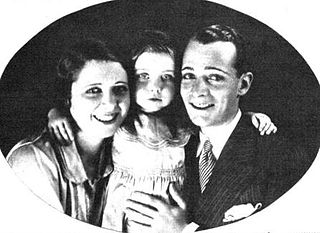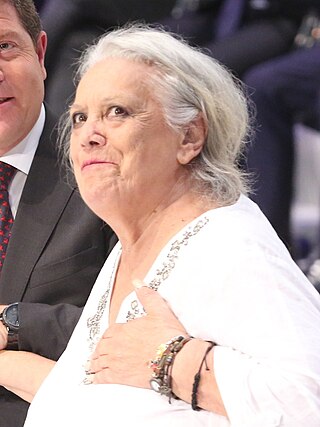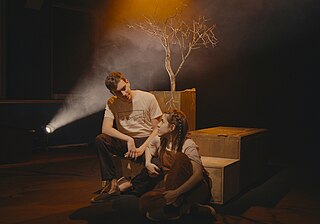Related Research Articles

Leonor Elizabeth Ceballos Watling is a Spanish film actress and singer.

Concepción Velasco Varona, known professionally as Concha Velasco, also Conchita Velasco, was a Spanish actress, singer, dancer, television presenter, and theatrical producer. She received numerous accolades throughout her career in film, theater, and television spanning over six decades, including two National Theater Awards presented by the Spanish Ministry of Culture in 1972 and 2016, the Lifetime Achievement Award presented by the Spanish Television Academy in 2009, and the Honorary Goya Award presented by the Spanish Film Academy in 2012.

Silvia Abascal Estrada is a Spanish film, television and stage actress. She landed a breakthrough role in 1995 sitcom Pepa y Pepe which advanced her career. She has since featured in films such as The Yellow Fountain, The Wolf, and The Idiot Maiden.

María del Carmen García Galisteo, known professionally as Carmen Sevilla, was a Spanish actress, singer, and dancer. She began her career in the 1940s and became one of the most popular and highest paid stars of Spanish cinema until the 1970s. In 1991, at the age of sixty, she began her career as a television presenter, working for the three major Spanish networks until her retirement in 2010. At the time of her death, she was one of the last surviving stars from the Golden Age of Mexican cinema and from the Golden Age of Hollywood.

José María Coronado García is a Spanish film and television actor and former model. His performances playing law enforcement officer roles have brought him some of the greatest successes of his career.

Laia Marull Quintana is a Spanish actress. She has won three Goya Awards — Best New Actress for Fugitives (2000), Best Actress for Take My Eyes (2003), and Best Supporting Actress for Black Bread (2010). She was also nominated for European Film Award for Best Actress for Take My Eyes.

Teatro Español, formerly Teatro del Príncipe and Corral del Príncipe, is a public theatre administered by the Government of Madrid, Spain. The original location was an open-air theatre in medieval times, where short performances and some theatrical pieces, which became part of famous classical literature in later years, were staged. Its establishment was authorized by a royal decree of Philip II in 1565.
Punishment without Vengeance is a 1631 tragedy written by the Spanish playwright Lope de Vega at the age of 68, centred on adultery and a near-incestuous relationship between step-mother and step-son. The play is regarded as one of Lope’s supreme achievements.

Macarena García de la Camacha Gutiérrez-Ambrossi is a Spanish actress. She won the Goya Award for Best New Actress for her performance in the 2012 silent film Snow White. She has since featured in films such as Palm Trees in the Snow and Holy Camp!.

María Carmen Díaz de Mendoza Larrabeiti was a Spanish theatre actress.

Teresa Marta Ruiz Penella, better known as Terele Pávez, was a Spanish actress. She appeared in more than ninety films since 1954.

Adela Carboné was an Italian-born actress who lived in Spain.

Petra Martínez Pérez is a Spanish actress who has had a long career on stage, film and television.
Ana Beatriz Vázquez Argibay, better known as Ana Marzoa, is an Argentine-Spanish actress.
This is a list of Spanish television related events in 1981.

Celia Freijeiro García is a Spanish film, theater and television actress and producer.
Carmen Climent Roca is a Basque film, theatre and television actress, singer and dancer.
Koldo Abando Olabarri, known as Koldo Olabarri, is a Spanish film, theater and television actor.

Julen Guerrero Calvo is a Spanish film, theater and television actor and stage director.
Montserrat Blanch Ferrer was a Spanish actress.
References
- 1 2 3 4 Sergio Sánchez Collantes. "Mercedes Prendes Estrada (1903-1981), célebre actriz gijonesa". El Comercio, Gijón . Retrieved 22 February 2020.
- 1 2 3 4 "Mercedes Prendes Estrada". Real Academia de la Historia, Madrid . Retrieved 22 February 2020.
- 1 2 José L Bernabé Tronchoni (compiler) (16 February 2016). "Alfonso Prendes Fernández". Find A Grave Memorial 158227915. Retrieved 22 February 2020.
- ↑ Keith Gregor (3 November 2011). Shakespeare in the Spanish Theatre: 1772 to the Present. A&C Black. p. 6. ISBN 978-1-4411-2938-3.
{{cite book}}:|work=ignored (help) - ↑ Nicolás Montalbán Martínez. "La recepción de Shakespeare en los teatros nationales" (PDF). Universidad de Murcia. pp. 147–152. Retrieved 22 February 2020.
- ↑ "Triunfal estreno de Sueño de una noche de verano, un espectáculo maravilloso". Diario ABC. 8 December 1945. Retrieved 22 February 2020.
- ↑ Nicolás Montalbán Martínez. "La recepción de Shakespeare en los teatros nationales" (PDF). Universidad de Murcia. pp. 153–156. Retrieved 22 February 2020.
- ↑ Pedro Montoliú Camps (2005). Madrid en la Posguerra. Silex Ediciones. p. 401. ISBN 978-84-7737-159-5.
- ↑ Diario ABC, ed. (14 December 1946). "En el Español se representó triunfalmente Ricardo III, de Shakespeare" . Retrieved 24 February 2020.
- ↑ Diario ABC, ed. (5 October 1949). "Homenaje a Carmen Morell y Pepe Blanco en el Calderón" . Retrieved 24 February 2020.
- ↑ Diario ABC, ed. (3 May 1946). ""La conjuración de Fiesco", de Schiller, en magnífica adaptación de Marquina se estrena con gran éxito en el Español" . Retrieved 24 February 2020.
- ↑ "El castigo sin venganza en el Español". Diario ABC. 5 October 1943. Retrieved 24 February 2020.
- ↑ "Cartel de La discreta enamorada". Diario ABC. 23 October 1945. Retrieved 24 February 2020.
- 1 2 3 4 "Falleció la actriz Mercedes Prendes". El País, Madrid. 4 July 1981. Retrieved 24 February 2020.
- ↑ "Antonio Buero Vallejo". Ejemplos. Farlex, Inc., PA. Retrieved 24 February 2020.
- 1 2 "Prendes, Mercedes (Mercedes Prendes y Estrada" (PDF). Base de datos: Mujeres Asturianas Destacadas. Instituto Asturiano de la mujer Universidad de Oviedo . Retrieved 24 February 2020.
- ↑ "Mercedes Prendes". La tele de Ayer. 7 September 2019. Retrieved 24 February 2020.
- ↑ Manuel Gómez García (2 January 1998). Prendes Esrtrada, Mercedes. Ediciones AKAL. p. 680. ISBN 978-84-460-0827-9.
{{cite book}}:|work=ignored (help)